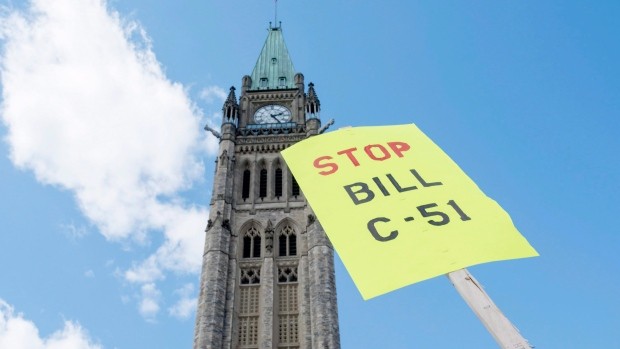CBC: Bill C-51 is now in force. What changes?
On Thursday afternoon Bill C-51 received Royal Assent and is now in force. Let's keep building opposition to C-51 until the election and then let's get it repealed: KillC51.ca Article by Hadyn Watters for CBC Bill C-51, the Conservatives' anti-terror legislation, received royal assent Thursday afternoon and is now law.
The bill has faced intense scrutiny for the expanded powers it gives the police and the Canadian Security Intelligence Service.
Opponents argue the bill's wording is too vague, which could lead to dangerous and unlawful measures.
Public Safety Minister Steven Blaney, who welcomed the bill's passage into law Thursday, has said the bill is necessary to keep Canadians safe.
Now that the bill is law, what changes? Here are five differences you may notice under C-51.
1. Promoting terrorism: a jail offence
Under C-51, encouraging or promoting others to carry out terrorist acts becomes its own criminal offence under the Criminal Code. Individuals can be found guilty regardless of whether the terrorist act they are promoting is carried out. According to the bill, it could land someone up to five years in prison.
There's concern at how much this new offence could impact the right to free speech. The bill is targeted at people who encourage or promote "the commission of terrorism offences in general." Opponents argue this definition is neither defined nor clear, leading to differing interpretations and wrongful use of the law.
2. Crackdown on terrorist propaganda
Expect a larger crackdown on people who share both physical and online copies of terrorist propaganda. C-51 adds a section to the Criminal Code that allows a warrant to be issued for those who share physical copies of material a judge deems to be terrorist propoganda.
- Read more at the CBC


 Take action now!
Take action now!
 Sign up to be in the loop
Sign up to be in the loop
 Donate to support our work
Donate to support our work